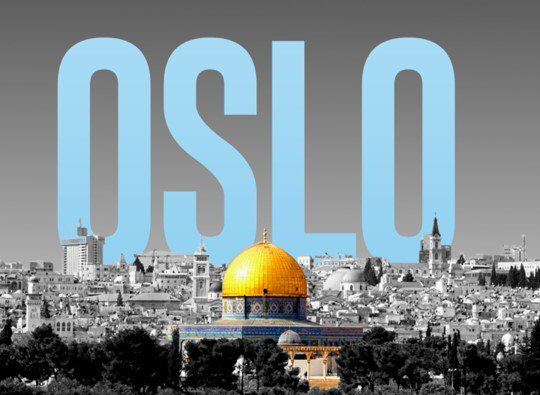Where Do Israel and Hamas Go From Here? Let’s Hope Their Negotiators See Oslo.
After another deadly conflict between Israel and Hamas, which controls Palestinian territories, change is coming to the top of the Israeli government. Relations between both sides, always complicated and suspicious, are changing rapidly and dramatically on the ground.
When the play Oslo opened off Broadway on New York City’s West Side in 2016 and then moved to Broadway in 2017, performances were very emotionally charged, given they were being presented in the world’s largest Jewish community. Yet the play wasn’t as timely as the film version, on HBO Max, is right now. The screenplay is written by the playwright, and both play and film have the same director.
The play Oslo opened off Broadway in New York City in 2016 and on Broadway in April 2017. It's now a movie on HBO Max.
Like the play, the film recreates the secret meetings in Oslo, Norway, in 1993 between representatives of the Palestine Liberation Organization and Israelis who favored dialogue with the PLO — even though it was illegal at the time for any Israeli to speak with any PLO member. For some delegates in Oslo, it was the first time they had ever met anyone from the opposite camp. The meetings resulted in the 1993 and 1995 Oslo Accords, and historic handshakes between Palestine’s Yasir Arafat and Israel’s Prime Minister Yitzhak Rabin and Foreign Minister Shimon Peres at the Clinton White House.
In late 1992, the PLO, in exile in Tunis, was on the verge of financial and diplomatic bankruptcy. Israel was almost as isolated and embarrassed. Official peace talks in Washington, D.C., were going nowhere; most of the world had decided neither side would ever change.
Just as many are asking today, “Where do Israel and the Palestinians go from here?”, Oslo reminds us of what amateurs accomplished in 1993. In Alfred Hitchcock’s Foreign Correspondent, set in Europe before the outbreak of World War II, a peace activist complains that some dismiss people like her as “well-meaning amateurs.” She snaps that “the world has been run long enough by well-meaning professionals” who have brought Europe to the brink of war.
In 1993, PLO and Israeli officials were brought to the negotiating table in Oslo not by a world power or a neutral country, but by two well-meaning amateurs, a dedicated Norwegian husband and wife. Terje Rod-Larsen worked for a nonprofit think tank, the Fafo Institute. His wife, Mona Juul, then a junior minister at the Norwegian Ministry of Foreign Affairs, had been stationed in the Middle East. They had seen first hand the anguish that fighting between Israel and the PLO had brought both sides.
The couple’s method in Oslo was to sit representatives alone with each other during the day to talk over policies, and then to bring them together again in the evening as their own personal friends. Dinners among these friends were fueled by Norwegian gourmet cuisine and plenty of wine and liquor. Guests learned about each other’s lives and personal experiences, told jokes, and began to see and listen to each other as people, not demons. The approach worked, personally and politically: An Israeli and a Palestinian, who discovered they both had daughters named Maya, became lifelong friends. As the Oslo meetings continued through 1993, the back channel of negotiations became the official green baize table.
The actors who play Mona and Terje in the film have talked about the way acting mirrors the work of diplomats: An actor must communicate a character’s needs, wants and varied truths. Indeed, the film makes clear how much improvisation the discussions in Oslo required. They also required a good sense of humor and an enormous amount of empathy to break down barriers between the negotiators.
At the end of the film, Mona writes a report on the 1993 process, anticipating “fierce resistance.” The Oslo Accords did not last long. In 1995, at a rally for the Accords in Tel Aviv, Rabin was assassinated by an Israeli extremist who opposed them. Israeli-Palestinian relations deteriorated into today’s conflicts.
But Mona concludes that attempting reconciliation is worthwhile. The accumulation of many attempts will change the status quo — as Northern Ireland demonstrates. Now, via HBO Max, audiences around the world can see Oslo, and learn what Mona and Terje did.
Tuesday, at a Webinar produced by The Common Good, I asked Efraim Halevy, former director of Mossad, Israel’s intelligence agency who advised Rabin, about the Oslo process. Did he think it would work again today?
Halevy, 86, said he didn’t think Oslo would happen again because “it outlived its usefulness.” Halevy’s personal dream is a new coalition between young Israelis and young Palestinians “in Gaza and Judea and Samaria” who want better lives. “It’s a dream, we may never reach a dream, but it’s a practical solution.”
Ann Marie Cunningham is a Columbia University Lipman Fellow for 2020 who will be working with the Mississippi Center for investigative Reporting. She is a veteran journalist/producer and author of a best-seller. Her work has appeared in The New York Times, Los Angeles Times, Technology Review, The Nation and The New Republic. Contact her at amc@mississippicir.org.


